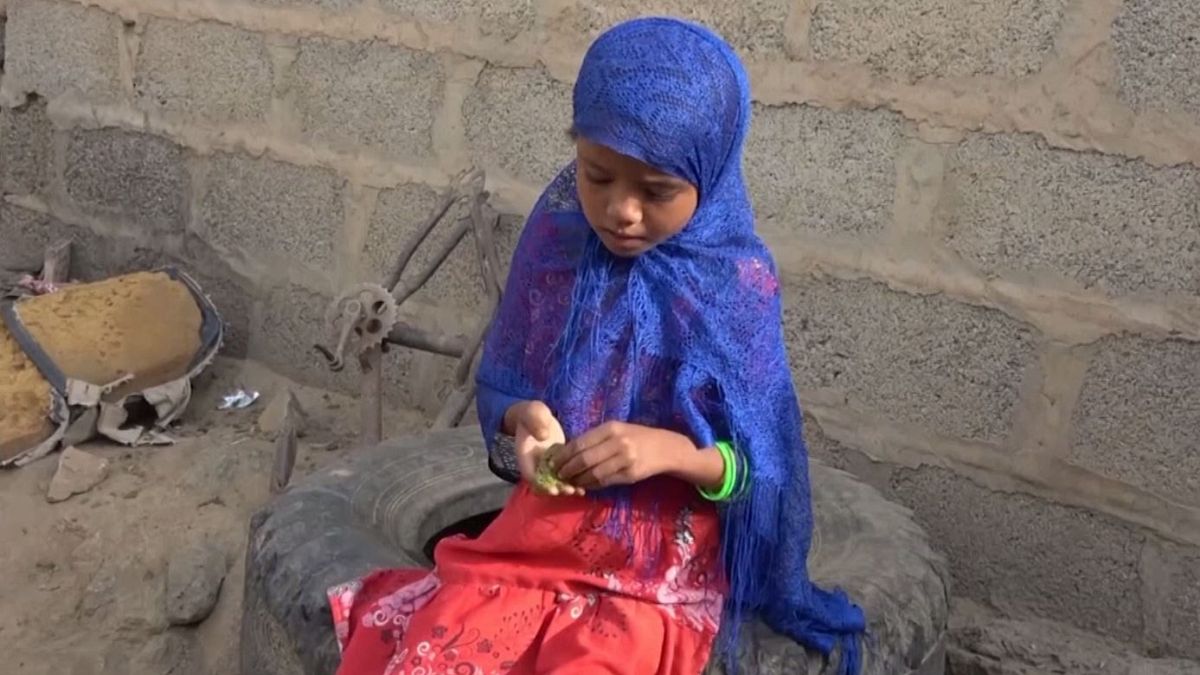Zahra, a seven-month-old, has already been treated for severe malnourishment. If not treated soon she will die.
The video shows Al-Mashrada village inhabitants in the Aslam region of northern Yemen boiling leaves in a desperate bid to live with humanitarian food aid failing to reach them.
Zahra, a seven-month-old, has already been treated for severe malnourishment. If not treated soon she will die, according to the Aslam health centre chief.
Her parents cannot afford to bring her to the doctor again.
Around 17 children attend the village clinic per week due to malnutrition.
However, without financial support or means to pay for medical care, untreated children face death.
Poor infrastructure and a lack of supplies plague medical staff in Aslam. The hospital staff use torches at night with the centre lacking electricity, oxygen tanks and paediatricians.
The "world’s worst humanitarian crisis" continues to spiral
The civil war has been described by UN Secretary-General, António Guterres as the "world’s worst humanitarian crisis", with over three-quarters of its population in need of humanitarian aid.
Political unrest began in 2011 with the ousting of Ali Abdullah Saleh as president in what was coined as the Yemeni Uprising.
Now in its third year, the civil war between the Saudi-led Arab coalition, and the Iran-backed Houthi rebels has led to millions of Yemeni civilians suffering from starvation in an already impoverished nation.
In 2015, Saudi-aligned forces intervened to reinstate the exiled government against Houthi rebels.
In December 2017, Saleh was killed in a roadside attack, which was hailed as a victory for the rebels, and descended the nation into deeper chaos.
According to the UN, as of March 2018, 8.4 million people in Yemen do not know when or how they will get their next meal, with 60% of the population or 18 million people suffering from food insecurity.
The wellbeing of Yemeni civilians has sharply declined in the past year with the UN reporting that the number of those suffering from severe starvation has grown by over a quarter in 12 months.
Continued fighting cuts off vital aid with international aid groups calling for ceasefires in order to deliver humanitarian support.
The Yemeni economy has continued to tip towards devastation, with basic food prices soaring 98% since the onset of the civil war. In the most war-torn regions, unemployment is as high as 50%, with the Yemeni rial losing more than half its value against the U.S. dollar since 2015.
Recent events
On August 28, UN experts released a report pointing to possible international war crimes by the parties involved in the civil war.
The report noted the civilian deaths caused by airstrikes, hitting residential areas, markets, medical centres, weddings and funeral services.
According to the United Nations Human Rights Office, between March 2015 and August 23 this year, 6,660 civilians were killed and 10,563 injured although the actual total is thought to be much higher.
One of the worst attacks on Yemeni children occurred on August 9 when at least 29 children died and a further 30 were wounded after an airstrike hit a school bus which was travelling through a market area in Dahyan, northern Yemen.
The attack sparked reinvigorated outcries by the international community, with the UN Security Council calling for “a credible and transparent investigation”.
Calls for talks between the two warring sides to come to a peaceful resolution have largely fallen on deaf ears over the course of the three-year conflict.
However, the UN Special Envoy for Yemen announced in August that he invited the parties to Geneva on September 6 in what would have been the first peace consultation to be held in over two years.
After three days of waiting, it became apparent that the peace talks were to collapse when the Houthi group failed to show up.
The rebels wanted a guarantee that their flight carrying their delegation would not be inspected by the Saudi coalition at a stop-over in Djibouti. They also wanted to use the plane to evacuate injured members to Oman or Europe.
Since then, Saudi-aligned forces resumed their efforts to capture Hodeidah, the main port in northern Yemen while they also seized the main road between Hodeidah to Sanaa in an attempt to cut off the Houthi rebel's main supply line.
